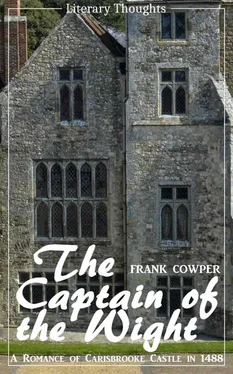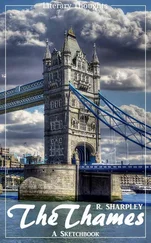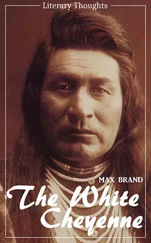The Abbot had settled himself comfortably in his saddle, and called his young kinsman up to him. The servants fell a little behind, Humphrey trying to draw the mendicant and his young daughter into conversation. But he only received short answers from the man, while the girl barely answered at all. The serving-man, unable to make anything out of either of them, gave up the attempt, and began to talk to the attendants of the Abbot.
It was a lovely June day. All the country looked crisp and bright in the clear sunlight. The road lay over a high hill, whence a broad landscape stretched before them, then it dipped down into the old town of Andover, where the cavalcade stopped before the rambling old wooden hostelry, and the Abbot refreshed himself with a cup of malmsey before they entered on the rather wild track of forest and down that lay between Andover and Winchester.
Leaving Andover, they crossed the low land on each side of the Teste, and that river itself near Chilbolton, and then rose over the steep acclivity of Barton Stacey down, with its wide ridge of hills stretching east and west in bleak loneliness, to face the sweeping winds that roared over them from the south-west bringing up the salt of the channel to invigorate the sheep that browsed over their slopes.
The Abbot discoursed from time to time of the various duties Ralph would have to fulfil, how he must conduct himself towards his superiors, equals, and inferiors; and his advice was certainly considerably more worldly-wise than had been that of Ralph's father and mother.
The boy listened attentively; but somehow, with the quick intuition of youthful directness, he detected the ring of worldly wisdom, as differing from the ingenuous simplicity of his' parent's advice. He could not help being amused and interested with the many little anecdotes with which the Abbot illustrated and enlivened his advice, while he felt more than ever how little he knew of the world and its ways.
"Now look you, fair kinsman," said the Abbot. "'Tis a right thing, and one well-pleasing to Holy Church, to be generous and free-handed; but 'tis not wise to give blindly, and without due inquiry. Thou lentest yonder idle vagrant thine horse yesterday. The holy saints guided him aright to thy father's house; but he might, for aught thou knewest, have just as well taken thine horse to Weyhill horse-fair, and there sold him, or ridden away where thou wouldst never have seen him more."
"But, my lord Abbot," cried the boy, "I liked the sound of his voice, and his words were fair: he could not but be honest."
"See there now; alack! good lack! the boy will surely come to harm an he goeth on like that! See you not, fair kinsman, that an you hearken to all fair words and gentle voices, you will e'en be stripped as clean as a rose bush with a blight on it? That is what I say, wait and see. I say not 'give not,' but look well before you give.
"Then again in a quarrel--for hot youth must needs quarrel--be wary how you enter in; see well that your adversary is one from whom you can hope to obtain honour,--one that if you vanquish him can yield you due satisfaction and fair guerdon, or, if he should vanquish you--for you must e'en look to both sides--that he be one to whom you may yield without loss of honour,--sithen he be so puissant a foe that there is as much honour gained in encountering him as there might be in overcoming another.
"In all things give heed and act discreetly. Be no tale-bearer, but listen well to all that goeth on. In all things serve thy master loyally; but be not so besotted as ever to be ruined for any. As for ensample, if thy lord choose a quarrel that must needs bring him to destruction, go not thou after him, but save thyself in time; as rats are said to cross by the hawser that mooreth a ship to the land, when they know of their own natural sagacity that ruin awaiteth that ship. Only give him fair notice thereof first. See how, during the late civil commotions, the Church hath acted discreetly, and saved her possessions in the midst of the broil. Even George, Archbishop of York, allied as he was to the Earl of Warwick and the Duke of Clarence, yet compounded with the late King Edward IV., on whose soul may God have mercy. But, blessed saints! whom have we here? 'Tis some noble baron, I doubt not, going to Winchester too, unless, indeed, it be the train of my Lord Woodville himself."
They had now reached a high bleak hill, and were nearly at the point where another road joined the one they were travelling by, which led from Marlborough and Cirencester to Winchester. Coming along this other road, which led from Reading, and just rising over the brow of the hill, Ralph could see a party of well-armed men. The dust from their horses obscured them partly, but he could make out that there were several footmen, carrying the formidable bill which dealt such deadly wounds, and gleaming above them were the helmets of two or three men-at-arms. The red crosses on their white surcoats, or tabards, showed that they belonged to the troops levied for the king, or at least raised by some noble for service, for which it was customary to take a contract.
"Ay, belike that's what they are," said the Abbot. "Do you, Peter, now ride on, while I tarry here to welcome my Lord Woodville; and take good lodgings for the night in Winchester, for me and my kinsman the Master Ralph de Lisle."
This was said to the chief of his lay brothers who acted as his serving-men, and who were clad in a dress very much resembling their lord's, but of a dark colour, instead of white.
Ralph was glad they were going to wait to meet the approaching party. He had never seen a band of armed men before, and he thought the appearance of these very imposing, as the pennons of the mounted men fluttered in the breeze.
"Ay, there's the banner of my Lord Woodville--he'll not be far behind," said the Abbot, as another little band mounted the hill, the centre figure carrying a little square flag on the end of a lance, which gaily waved its red and white colours as the horseman moved to the swing of his steed.
It was a very pretty sight. The wide-extending view, over broad pasture and swelling down, the distance hidden by a grey haze; the yellow road, leading straight across the green grass of the down, for the summer was hardly begun, while the gleaming weapons, white surcoats, and fluttering banners, mingled with the brilliant red of the crosses, and the blazon on the flag, contrasted well with the deep blue of the cloudless sky, fading away to the warm haze of the horizon. Gaily the grasshoppers chirped among the wild convolvulus on the roadside, the bees hummed over the clover, and the larks were soaring joyously in the azure overhead.
Ralph gave a sigh of enjoyment--life was already beginning.
The little party sat motionless on their steeds, the Abbot having reined up his horse at the junction of the two roads. Ralph sat on his horse beside him, and Humphrey, the other lay brother, and the sumpter horses, were grouped behind them--while behind them again was the poor man, leaning against the pony on which his daughter sat, who had, however, frequently insisted on her father taking her place.
Suddenly the Abbot remembered them.
"Beshrew me," he said, "I wish thy lady mother had not saddled me with these beggars; it beseemeth not a prelate like me to have such rapscallions attending on him."
The girl noticed the impatience of the Abbot, and partly heard his muttered words.
"Come, father, let us get hence before the others come; we but disgrace the noble Abbot and his fair nephew."
"Nay, nay, stay now," said the Abbot testily, relenting a little when he heard the soft voice of the girl. "'T would look worse an thou wert now to slip off as though I were ashamed of thee. Even stay and brave it out. After all, 'twill look seemly that I be busied in the protection of the poor and houseless. Ay, marry! 'twill please my Lord Woodville who ever jibeth at the pride of Mother Church, as he calleth it, when I appear in the state befitting the Abbot of the first house of our order in England, and patron of the Chapel of St Nicholas in his own castle of Carisbrooke. Prythee stay: 'twill be well!"
Читать дальше












